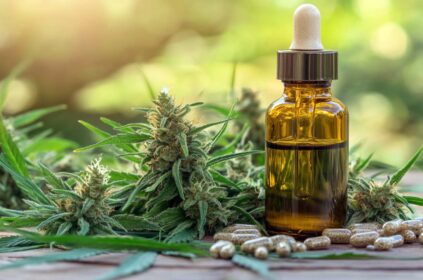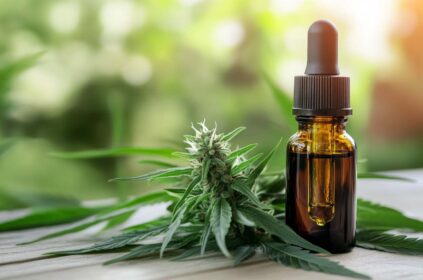Introduction
In recent years, Cannabidiol, commonly known as CBD, has emerged as a popular alternative for treating various mental health conditions, including Obsessive-Compulsive Disorder (OCD). As interest in holistic health solutions grows, it is essential to dive deep into the nuances of how CBD may help manage OCD symptoms, supported by scientific evidence and real-world applications. This comprehensive guide aims to demystify CBD’s potential, explore its benefits, and assess the current research landscape regarding its efficacy in treating OCD.
What is CBD and How Does it Interact with the Body?
CBD is a non-psychoactive compound extracted from the hemp plant. Unlike its more infamous counterpart, THC (tetrahydrocannabinol), CBD doesn’t cause users to feel high. Instead, it interacts with the body’s endocannabinoid system, a complex network responsible for maintaining homeostasis—essentially keeping various bodily functions in balance.
This endocannabinoid system regulates processes such as sleep, mood, appetite, and even immune responses. By interacting with receptors within this system, CBD has the potential for several therapeutic benefits, particularly in alleviating anxiety and OCD symptoms.
The Link Between CBD, Anxiety, and OCD
At the heart of OCD lies anxiety, which manifests as relentless intrusive thoughts (obsessions) and the compulsive behaviors individuals engage in to mitigate that anxiety. Studies suggest that CBD may offer significant relief:
- Anxiety Reduction: A notable study published in the Journal of Psychopharmacology demonstrated that CBD reduced anxiety levels in individuals during a simulated public speaking scenario, highlighting its potential to calm nerves effectively.
- User Testimonials: Many CBD users report experiencing marked improvements in anxiety levels and sleep quality, with anxiety often ranking among the primary reasons for trying CBD.
- Clinical Observations: A small case study indicated that patients treated with CBD experienced about a 60% reduction in compulsive behaviors and a 52% drop in anxiety levels, hinting at CBD’s effect in managing OCD.
How CBD May Help with OCD Symptoms
The relationship between CBD and OCD management is still under investigation, but several theories explore the mechanisms involved:
- Anxiety Alleviation: Given the intertwined nature of anxiety and OCD, CBD’s ability to reduce anxiety can be a crucial factor in diminishing compulsive behaviors.
- Endocannabinoid Modulation: CBD’s interaction with the endocannabinoid system could promote regulatory changes that help manage mood and anxiety.
- Animal Model Research: Laboratory studies indicate that CBD may inhibit compulsive behaviors in animals, laying the groundwork for exploring its potential benefits in humans.
Current Research and Evidence
Though research on CBD’s effects specific to OCD is still in its infancy, emerging findings hint at promising possibilities:
- Case Studies: Multiple anecdotal reports and case series suggest improvements in OCD symptoms when using CBD, including reduced compulsions and clearer thinking.
- Animal Studies: Systematic reviews have shown CBD’s effectiveness in reducing compulsive behavior in animal studies, indicating its potential utility in human treatments.
- Call for Further Research: Despite encouraging data, there remains a pressing need for large-scale clinical trials to robustly evaluate the efficacy and safety of CBD for OCD treatment.
Treatment Options for OCD: Where Does CBD Fit In?
Traditional treatments for OCD primarily encompass therapies and pharmacological interventions:
- Cognitive Behavioral Therapy (CBT): Involving techniques such as Exposure and Response Prevention (ERP), CBT encourages individuals to confront fears without resorting to compulsions. While effective, it demands significant effort and commitment.
- SSRIs: Selective Serotonin Reuptake Inhibitors (SSRIs) are a common pharmacological option. Though effective for many, SSRIs may have unpleasant side effects and might not work for everyone.
In this landscape, CBD can serve as a complementary option rather than a substitute for established treatments. It shows promise in enhancing overall treatment efficacy while generally being well-regarded in terms of safety.
Best Forms of CBD for OCD
CBD comes in various formulations, each with its advantages. The most common forms include:
- Oils and Tinctures: These allow for precise dosing and can be placed directly under the tongue for rapid absorption.
- Gummies: Ideal for those who prefer a flavorful experience, gummies offer a convenient and discreet option.
- Topicals and Patches: While more focused on localized relief from pain or inflammation, some users may find these options beneficial.
While no single form of CBD is conclusively more effective than another for OCD, it’s crucial to focus on dosage. Starting low and adjusting gradually, preferably under medical supervision, is advisable to determine what works best for the individual.
Conclusion
CBD holds potential as a supplementary approach to managing OCD symptoms, particularly for reducing anxiety and compulsive behaviors. While current evidence is predominantly anecdotal and requires further validation through rigorous research, the initial findings are encouraging for many individuals wrestling with OCD.
Key Takeaways
- Consult a Healthcare Professional: Before incorporating CBD into an OCD treatment plan, it’s essential to speak with a healthcare provider who can tailor advice to your specific situation and needs.
- Combine with Established Treatments: CBD is most effective alongside traditional approaches, such as CBT or medication, rather than as a standalone solution.
- Monitor and Adjust: Start with a low dose, observe your response, and adjust as necessary in consultation with a healthcare provider.
Next Steps
For those considering the inclusion of CBD in their OCD management strategy:
- Stay Updated: Keep a pulse on ongoing research and clinical findings to remain informed about CBD’s therapeutic potential.
- Select Quality Products: Invest in high-quality, third-party tested CBD products to ensure safety, potency, and efficacy.
- Participate in Support Groups: Sharing experiences in community groups can provide support and valuable insights into the day-to-day management of OCD with CBD.
With the right approach and informed choices, CBD may become a valuable ally for those navigating the challenges of OCD, contributing positively to overall mental health and wellness.





















